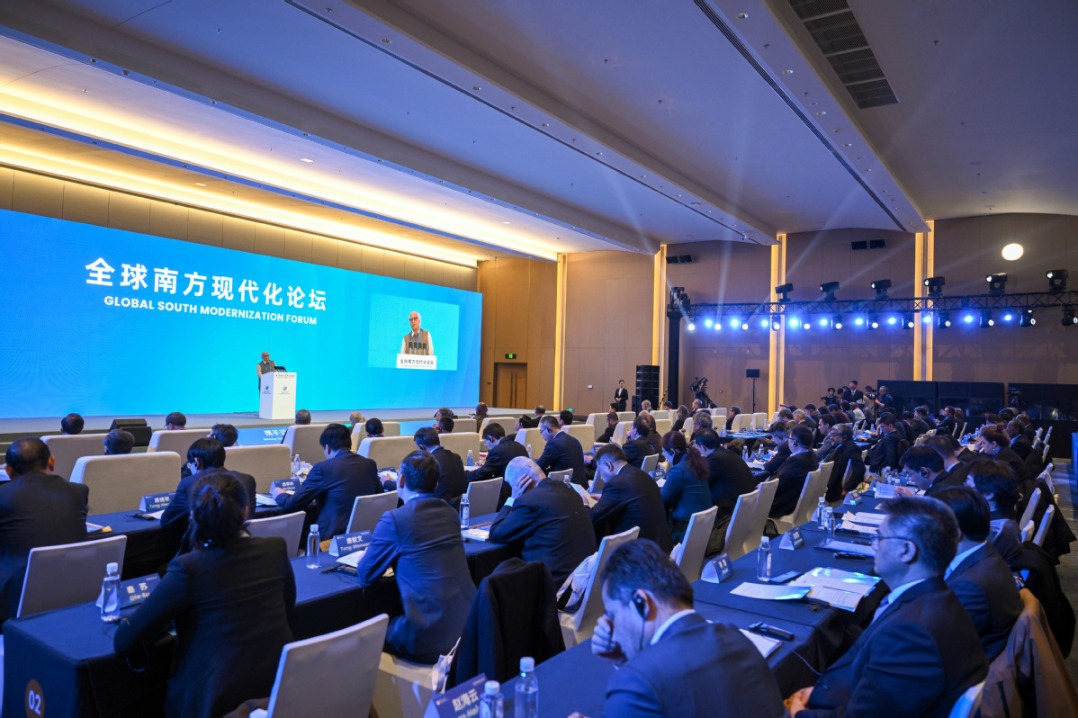Creating a solid growth platform

Pragmatic approach built on equality and partnership has helped improve educational cooperation
Ever since China's economic development model and the quality of its higher education gained global recognition, there has been a steady stream of African students studying in China.
While some of these students are undergraduates, there are also those who are in China for master's or doctoral programs. The arrival of these students has offered new cultural perspectives and fresh insights on Africa and also highlighted how educational achievements can deepen and reinforce China-Africa cooperation.
China-Africa educational cooperation is an important part of the China-Africa friendly cooperation framework that aims to propagate multi-field educational exchanges. These exchanges can improve understanding of each other's culture, maintain cultural diversity and promote peaceful coexistence and equality of the two societies.
By the end of last year, China had provided government scholarships to more than 41,860 people from Africa. In 2013 alone, 6,300 students from 49 African countries were offered various scholarships by the Chinese government. These included fields like electronics, communications, computers, physics, medicine, textiles, agriculture, law and Chinese language. The number of African students who got the scholarships for the above-mentioned sectors reached more than 1,100 in 2013, accounting for 41 percent of China's total foreign student scholarships.
In addition, China has attracted many self-financed African students. From 1995 to 2013, more than 13,000 African students studied in China at their own expense. Some of them were general scholars, some short-term training students and undergraduates mainly studing Chinese, medicine, management, computers, electronics and communications technologies.

To better promote educational exchanges with China, Rwanda and Tanzania provide full scholarships and other forms of support for their students to study in China. China-Africa interchangeable scholarships have also been gradually scaled up. In recent years, according to the teaching characteristics of Chinese universities and the actual needs of African students, China and African countries have adjusted their focus on academic training and appropriately increased the proportion of graduate enrollment.
Of the 4,357 African students in China during 2013, nearly 57.3 percent were enrolled in master's and doctoral programs, say statistics provided by the National Institute of Educational Sciences. Some Chinese universities have also started courses in English or French to offer wider curriculum choices to African students.
The Chinese government also subsidized primary and senior civil servants from African countries to University of International Business and Economics, Beijing Jiaotong University, China Agricultural University and Renmin University for short-term courses in economic, urban planning, transportation, customs affairs and agriculture.
Currently, China aims to promote Africa's independent educational development. Africa has long been reliant on foreign aid, which somehow has often failed to resolve many indigenous issues. China's assistance wants to strengthen Africa's capacity to create its own culture and human resources. Unlike other foreign countries, China has showcased its experiences in Africa, and allowed African governments to forge their own development paths.
To help students adapt better to African society after graduation in China, the Chinese government is helping African universities establish specialized laboratories, and sending teachers and experts to conduct collaborative research. As of 2013, China had given educational assistance to nearly 120 projects in 34 African countries, and established 23 specialized labs in biology, microbiology, computers, physics, chemistry, food preservation and processing.
This indicates that Chinese and African universities have enormous potential to carry out inter-school exchanges and scientific cooperation. Advantages of the African universities such as anthropology, ethnology, geology, mining, medicine and archeology have great appeal to China, while China's reform and opening-up is equally attractive to African universities.
China-Africa academic exchanges are complementary, and both sides can learn from each other. By the end of 2013, 57 Chinese universities had established inter-school cooperation and exchanges with 43 colleges and universities from 36 African countries. The Chinese universities and large state-owned enterprises have also been able to select good African talent according to their country's needs with the help of the local embassy. For example, many Ethiopian students came to China to study civil engineering, while Ghana, Angola and Zambian students were keen on learning water conservation and energy utilization techniques. Mozambique students on the other hand, chose to sharpen their skills in agriculture-related technologies.
China's educational assistance to Africa has been without any additional conditions, and without any interference in the educational policies of African countries. China-Africa educational cooperation is built more on the basis of equality and partnership, while stressing pragmatic approaches. For example, to improve the efficiency of the use of the Chinese government scholarships, the Ministry of Education decided in 2010 to offer students one or two years of training in Chinese before commencing their courses.
At the same time, China-Africa educational cooperation also emphasizes two-way communication mainly between insititutions. The cooperation, however, does not exclude multilateral cooperation. The Chinese government is also discussing the feasibility of in-depth educational cooperation under the framework of the China-Africa Cooperation Forum.
The author is a researcher at the research center for higher education under the National Institute of Education Sciences. The views do not necessarily reflect those of China Daily.
(China Daily Africa Weekly 05/16/2014 page10)
Today's Top News
- G20 an opportunity to strengthen Sino-EU ties
- China, Africa foster shared food security
- Japan urged to take practical steps to honor its commitments to China
- Direct dialogue on climate change stressed
- Talks prompt Dutch action on Nexperia
- Forum hailed for promoting Global South modernization






























